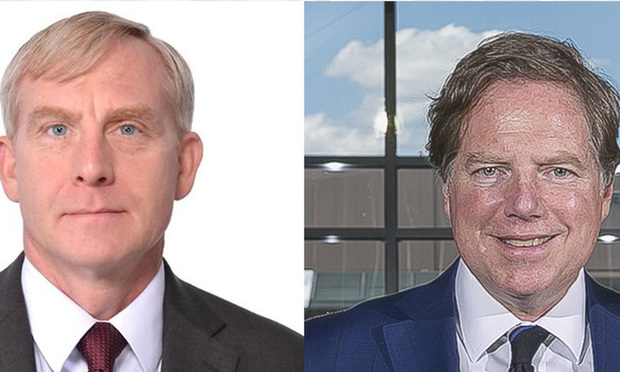Interim US Attorneys in New York Start Work; Permanent Selection Looms
The interim appointees picked to lead the U.S. Attorney's offices for New York's Eastern and Southern districts, among the most prestigious federal prosecutors' offices in the country, took their new positions on Friday, and observers said they expected the White House to ultimately name them for permanent appointments.
January 05, 2018 at 04:10 PM
6 minute read
 Left to right: Richard Donoghue and Geoffrey Berman.
Left to right: Richard Donoghue and Geoffrey Berman. The interim appointees picked to lead the U.S. Attorney's offices for New York's Eastern and Southern districts, among the most prestigious federal prosecutors' offices in the country, took their new positions on Friday, and observers said they expected the White House to ultimately name them for permanent appointments.
On Jan. 3, U.S. Attorney General Jeff Sessions, citing the expiring 300-day terms of acting U.S. attorneys who resigned—or fired, as was the case for former Southern District U.S. Attorney Preet Bharara after he refused to step down—appointed interim heads to federal prosecutors offices to serve 120-day terms for 17 offices across the country, including three in New York.
Sessions appointed Geoffrey Berman, who was a shareholder at Greenberg Traurig at the firm's New Jersey office, as interim head of the U.S. Attorney's Office for the Southern District of New York; and Richard Donoghue, the chief litigator at software giant CA Technologies, to lead the U.S. Attorney's Office for the Eastern District of New York.
Berman and Donoghue's names had been thrown around throughout last year as possible nominees for the seats and observers say it is likely that they will be nominated to be confirmed by the U.S. Senate as full-fledged U.S. attorneys.
But the two picks by a Republican administration would be subject to the so-called “blue slip” process whereby the two senators from a nominee's home state—which are both Democrats in New York—submit a thumbs up or thumbs down on the nominee to be taken into the Senate's consideration.
Quoting an unnamed source with knowledge of the process, NBC reports that the offices of Sens. Charles Schumer and Kirsten Gillibrand have expressed approval of Donoghue but have yet to do so for Berman. Both offices did not respond to requests for comment.
Last March, Bridget Rohde took over as acting U.S. attorney for the Eastern District after Robert Capers resigned, and Joon Kim took over as an acting U.S. attorney after Bharara's highly publicized departure from the office. Acting U.S. attorneys can serve for 210 days after their appointment.
Rohde is taking her old job as first assistant U.S. attorney and Kim is leaving the Southern District. The Southern District U.S. Attorney's Office did not respond to a request inquiring about Kim's future plans.
Alumni from the U.S. attorneys offices for both the Eastern and Southern districts praised Sessions' choices for the fact that Berman and Donoghue are alumni of those offices themselves, though Donoghue's tenure was longer and more recent: he worked at the office from 2000 to 2011 and has been credited for his work on public corruption cases as well as cases involving the MS-13 gang.
Mark Lesko, a former Eastern District prosecutor from 2002 to 2009 who worked during that time with Donoghue in the office's Criminal Division, said that other alumni were relieved by Sessions' choice because of his experience and familiarity with the office.
“He's part of the EDNY family,” said Lesko, who later ran successfully as a Democrat for town supervisor for the Town of Brookhaven on Long Island. ”He really knows this office soup to nuts.”
Berman worked for the Southern District from 1990 to 1994 and later joined Greenberg Traurig. Former New York City Mayor and Republican presidential candidate Rudolph Giuliani, who had ties to President Donald Trump's campaign, joined Greenberg Traurig last year after removing his name from the shingle of his old firm, Bracewell.
Last year, Berman gave $5,400 to Trump's election campaign, according to the Federal Election Commission.
The U.S. Attorney's Office for the Southern District of New York did not respond to a request for Berman to comment on his association with Giuliani or the donation to Trump's campaign.
Donoghue also gave money to a Republican presidential candidate last year: He gave $550 to Florida Sen. Marco Rubio's campaign.
Sharon Cohen Levin, a partner at Wilmer Cutler Pickering Hale and Dorr who worked at the Southern District U.S. Attorney's Office from 1991 to 2015, said that she does not think the donation and the fact that her former colleague worked at the same firm as Giuliani would have any bearing on how he would run the office.
“He's committed to doing the right thing,” she said.
During her tenure, Levin saw several U.S. attorneys—including actings and interims, and Republicans and Democrats—come and go and said that, while new leaders might alter the course of the cases the office pursues, the Southern District's mission remained “100 percent consistent.”
“The U.S. attorneys who came in made some changes—they did press conferences differently, they changed the names of units,” she said. “But the work remained the same.”
If the Senate does not confirm permanent heads of the U.S. attorneys offices by the end of the interim heads' 120-day terms, the U.S. district courts may fill the offices' respective districts by appointing interim U.S. attorneys until the vacancies are filled.
Richard Revesz, who was dean of New York University School of Law from 2002 to 2013 and who is now director of the school's Institute for Policy Integrity, said that the administration may have wanted to put its own political appointees in place to head those offices before the more cumbersome process of confirming the nominees kicks off.
“For whatever reason, vetting and nominating people for these positions took longer than for some other positions,” Revesz said.
In 2003, David Kelley, who was appointed as interim head of the Southern District U.S. Attorney's Office after the departure of James Comey and, after his 120-day term expired, was appointed by the U.S. District Court for the Southern District of New York to continue serving in that role. He remained there until 2005.
This content has been archived. It is available through our partners, LexisNexis® and Bloomberg Law.
To view this content, please continue to their sites.
Not a Lexis Subscriber?
Subscribe Now
Not a Bloomberg Law Subscriber?
Subscribe Now
NOT FOR REPRINT
© 2025 ALM Global, LLC, All Rights Reserved. Request academic re-use from www.copyright.com. All other uses, submit a request to [email protected]. For more information visit Asset & Logo Licensing.
You Might Like
View All
New York-Based Skadden Team Joins White & Case Group in Mexico City for Citigroup Demerger

Bankruptcy Judge Clears Path for Recovery in High-Profile Crypto Failure
3 minute read
US Judge Dismisses Lawsuit Brought Under NYC Gender Violence Law, Ruling Claims Barred Under State Measure
Trending Stories
Who Got The Work
J. Brugh Lower of Gibbons has entered an appearance for industrial equipment supplier Devco Corporation in a pending trademark infringement lawsuit. The suit, accusing the defendant of selling knock-off Graco products, was filed Dec. 18 in New Jersey District Court by Rivkin Radler on behalf of Graco Inc. and Graco Minnesota. The case, assigned to U.S. District Judge Zahid N. Quraishi, is 3:24-cv-11294, Graco Inc. et al v. Devco Corporation.
Who Got The Work
Rebecca Maller-Stein and Kent A. Yalowitz of Arnold & Porter Kaye Scholer have entered their appearances for Hanaco Venture Capital and its executives, Lior Prosor and David Frankel, in a pending securities lawsuit. The action, filed on Dec. 24 in New York Southern District Court by Zell, Aron & Co. on behalf of Goldeneye Advisors, accuses the defendants of negligently and fraudulently managing the plaintiff's $1 million investment. The case, assigned to U.S. District Judge Vernon S. Broderick, is 1:24-cv-09918, Goldeneye Advisors, LLC v. Hanaco Venture Capital, Ltd. et al.
Who Got The Work
Attorneys from A&O Shearman has stepped in as defense counsel for Toronto-Dominion Bank and other defendants in a pending securities class action. The suit, filed Dec. 11 in New York Southern District Court by Bleichmar Fonti & Auld, accuses the defendants of concealing the bank's 'pervasive' deficiencies in regards to its compliance with the Bank Secrecy Act and the quality of its anti-money laundering controls. The case, assigned to U.S. District Judge Arun Subramanian, is 1:24-cv-09445, Gonzalez v. The Toronto-Dominion Bank et al.
Who Got The Work
Crown Castle International, a Pennsylvania company providing shared communications infrastructure, has turned to Luke D. Wolf of Gordon Rees Scully Mansukhani to fend off a pending breach-of-contract lawsuit. The court action, filed Nov. 25 in Michigan Eastern District Court by Hooper Hathaway PC on behalf of The Town Residences LLC, accuses Crown Castle of failing to transfer approximately $30,000 in utility payments from T-Mobile in breach of a roof-top lease and assignment agreement. The case, assigned to U.S. District Judge Susan K. Declercq, is 2:24-cv-13131, The Town Residences LLC v. T-Mobile US, Inc. et al.
Who Got The Work
Wilfred P. Coronato and Daniel M. Schwartz of McCarter & English have stepped in as defense counsel to Electrolux Home Products Inc. in a pending product liability lawsuit. The court action, filed Nov. 26 in New York Eastern District Court by Poulos Lopiccolo PC and Nagel Rice LLP on behalf of David Stern, alleges that the defendant's refrigerators’ drawers and shelving repeatedly break and fall apart within months after purchase. The case, assigned to U.S. District Judge Joan M. Azrack, is 2:24-cv-08204, Stern v. Electrolux Home Products, Inc.
Featured Firms
Law Offices of Gary Martin Hays & Associates, P.C.
(470) 294-1674
Law Offices of Mark E. Salomone
(857) 444-6468
Smith & Hassler
(713) 739-1250







